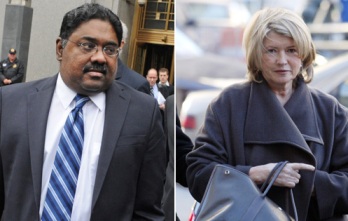Just before signing The Stock Act which now makes it illegal for members of Congress and their staff to profit from inside financial information, President Obama declared, “The powerful shouldn’t get to create one set of rules for themselves and another set of rules for everybody else.”

In 2004, I once asked a well-connected financial guy why someone like businesswoman and billionaire Martha Stewart, would risk her reputation on a piece of insider information to save $45,000?
His answer: “Because they can.”
In 2005, I appeared on CNN’s NewsNight with Aaron Brown to debate the pros and cons of Stewart who had just been released from prison on her way to serve the rest of her sentence in home confinement. Speaking in favor of Stewart was Vanity Fair writer and author Michael Wolff. I took the opposing side pointing out the fact that although Stewart had served her term in prison there was absolutely no remorse on her part. In fact, Stewart never once admitted to any wrongdoing and fought the charges all the way.
On May 11, 2011, billionaire hedge fund manager Raj Rajaratnam was found guilty of fraud and conspiracy regarding insider information and sentenced to 11 years in prison and fined $10 million. The New York Times wrote (Apr. 4), “The government estimated that his illegal activities generated profits of over $60 million, but his hedge fund managed $7 billion at its peak, and relatively few of its trades were based on inside information.”
Similarly, Martha Stewart “lost millions on paper in her stake inMartha Stewart Living Omnimedia, whose market value plunged after charges were filed… She later settled a civil suit filed by the Securities and Exchange Commission by paying about $195,000 in disgorgement and penalties.”
More recently, Dallas Mavericks owner Mark Cuban, whose net worth is estimated at $2.3 billion, has been accused by the SEC of insider trading.
So, why do they do it? Why risk millions in fines, legal fees, not to mention becoming a felon, all for a fraction of money compared to their net worth?
That’s the ethical question Times reporter Peter Henning was looking to answer in a story last week. His conclusions:
“People who are used to making decisions quickly may not reflect on whether the information they receive takes them close to the line between permissible trading and securities fraud… unlike theft or even accounting fraud, which can harm a company’s bottom line and stock price, insider trading is a violation in which there is no easily identifiable victim… The real victim is the market, a faceless mass of billions of dollars’ worth of transactions daily.
“These are not valid excuses,” Henning makes clear, “for those who trade on confidential information, but they can help explain why even sophisticated, wealthy investors can fall into the trap of insider trading.
“The mind-set that one could not have violated the law may also help explain why wealthy defendants fight charges so vigorously even though their cases often involve comparatively small amounts and paying a civil penalty would be much cheaper. It becomes a matter of principle, and personal resources are mobilized to fight the charges.”
The same can be said of political leaders who consistently get caught in their own scandals in spite of witnessing colleagues caught in similar offenses.
I once asked the former head of the Office of Government Ethics, “why do so many smart people throw away common sense in the face of obvious evidence?”
His response: “You don’t understand, Jim. These people live in a bubble. They are pampered and catered, and placed on a pedestal that eventually they see themselves as immune from issues that you and I see as obvious.”
It’s the Everybody-Does-it Defense whereby individuals buy into the false notion of safety in numbers. If everybody does it, it can’t be wrong.
However, the reality in any marketplace is this: people need to be able to trust that those in authority, involved in every area of our lives, are acting responsibly and telling us the truth. Most people can handle the truth. What they can’t handle, what they won’t tolerate is being misled, deceived and lied to.
In signing The Stock Act, President Obama said that the act “makes clear that if members of Congress use nonpublic information to gain an unfair advantage in the market, then they are breaking the law.
“If we expect that to apply to our biggest corporations and to our most successful citizens, it certainly applies to our elected officials, especially at a time when there is a deficit of trust between this city and the rest of the country.”
Comments









